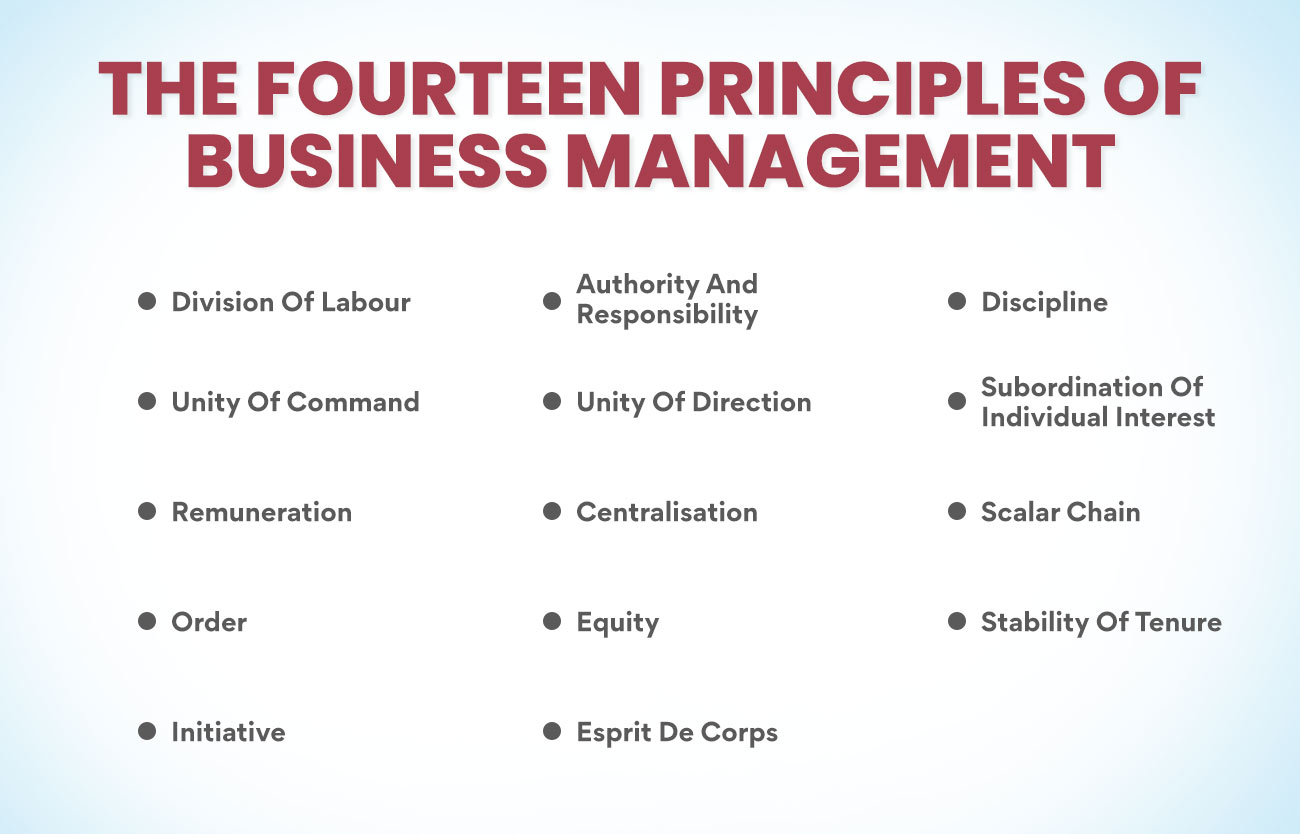Companies comprise various functions. A company has different departments looking after the numerous activities that are essential for the organization. Finance, human resource management, marketing, production, etc., are different functions that must come together to achieve a common goal. All these departments consist of numerous employees who must all work towards the same objectives even if they are doing different tasks. A business manager brings together all team members and ensures they work towards their common goal. The principles of business management guide these professionals and help them perform efficiently.
Before we look at these principles, it is essential to know what business management is and why it is needed in an organization. You will learn about this in the Advanced Executive Certificate Course In Business Management In Digital Era. Our website provides more details about this course.
What Is Business Management?
Business management refers to coordinating various activities in a company to achieve its business and financial goals. This function also includes managing resources like money, people, and machinery to ensure that the objectives set by the top management are met. Business managers must manage and supervise different teams to ensure they perform as desired. They must also ensure the team members possess the necessary skills to complete their tasks successfully. One of the principles of business management states that managers must look at the skills of their team members and assign suitable jobs.
Business managers must possess both technical and soft skills if they want to be successful. Having complete knowledge about the job they expect employees to do earns them respect. But these professionals must have soft skills to manage people and maintain the respect they earn. Employees working in a company come from different backgrounds, and this can result in conflicts. Business managers must be able to resolve such issues and ensure that work gets done on time. The principles of business management make an excellent guide for BMs to execute their plans and ensure that the team meets their objectives.
Who Was Henry Fayol?
Before we look at the principles of business management, we must know who formulated these principles and why they are relevant even today. These principles were written by Henry Fayol, who was a mining engineer. After working a few years as an engineer, he was promoted to general manager and, subsequently, the director of administration.
Henry Fayol’s vast experience in managing his team gave him the expertise to formulate these principles that still guide managers today. He founded the school of thought known as the Classic Theory Of Management, which was very popular in the early twentieth century.
His principles greatly helped the managers of those times interact and work with employees efficiently. Those principles still influence the management of companies. Those principles of business management are still relevant because they are general and can be applied to any business, management level, or department. Many modern management theories have appeared after Henry Fayol. But his theories are the foundation for many modern management theories. All business managers still learn these principles as they help them to do their duties more efficiently.
The Fourteen Principles Of Business Management
- Division Of Labour
As a business manager, you must know which employees are good at what jobs and what skills they possess. Even those who have studied at the same school and university need not be good at the same tasks. They can have different preferences about what they like to do. The best way to get maximum work done from employees is to give them the job they like to do the most. Dividing the tasks among workers as per their expertise is one of the principles of business management that will help managers get the best out of their subordinates.
Another advantage of dividing work is that each member does the same job repeatedly. It leads to every individual becoming an expert in their work. It also reduces the chances of conflict as staff members are likely to refrain from interfering in another person’s work. If you go to any production or packing unit, you will see that each person performs only the same task, and things move quickly. It is one of the principles of business management that will speed up the delivery of things to customers and ensure their satisfaction.
- Authority And Responsibility
It is one of the principles of business management that every manager must understand. It is not just in their power to get work done. They are also responsible for the outcome of the action. Managers cannot place the responsibility on the employees as they are the ones calling the shots. This makes it essential for managers to choose the right team.
Even if one person works slowly and disrupts the process, you cannot blame that employee. The manager must take responsibility for the delay in the task. For this reason, they must choose the right people for their team. Managers must know every employee’s skills, which will help form a team with all the necessary capabilities. When business managers take responsibility for the result, the employees will respect them. This is one of the principles of business management that guides managers to choose their teams carefully.
- Discipline
Nothing can run properly if there is no discipline. It is not true just for your business but also for your home. Employees must be disciplined, and this must be enforced from the beginning itself. Including a statement about discipline in the welcoming mail sent to new employees is best. They will know what is expected from them in terms of work and workplace behavior. The statement can also mention what the employees can expect from their managers. It will make it a balanced statement without any bias.
The principles of business management state that it is not enough to state discipline. Employees must see the managers act in the way expected of them. Managers must show discipline in their daily activities. They must also show respect for every member of the staff. This principle is laid down to ensure order at work. When managers show that they are disciplined, the employees will also follow the same working style. Such managers can be proud of leading a highly disciplined team. Such team members will do their work correctly and respect others.
You can learn more about how to enforce discipline in your team at the Advanced Executive Certificate Course In Business Management In The Digital Era. More information about this course is available on our website.
Read More: What is a Business Administration Course?
- Unity Of Command
It must be ensured that employees receive their instruction from one source of the command. When they get instructions from two or more people, the work is likely not done. They will wonder what task must be completed first. If both the managers who are giving the instructions are on the same level, then it is sure that there can be a conflict between them. Both will want their orders to be executed first. Such a situation can put workers in a dilemma, and they will lose interest in their work.
It is one of the principles of business management that is most applicable to partnership businesses. Employees in such a company can receive instructions from both these people, and they will be left wondering which one to follow. Such employees will always be at the receiving end because they would not have completed at least one of the tasks entrusted to them. They are likely to leave the job sooner or later. Companies must ensure only one center of command for certain functions. It will ensure smooth working and better productivity.
- Unity Of Direction
Something that is commonly found in many companies is that different teams work in different directions. In many cases, they are prevented from interacting with other departments. It will end in people working in different directions and goals. Only if all the employees of a company work towards the same goal will the organization be able to achieve its desired results. Each department has its own set of tasks and responsibilities. They must complete these without fail. But that doesn’t mean they should not interact with other departments and work together.
Managers of these departments should give clear instructions to their teams about their duties. They must also guide the team members in completing the tasks and achieving their goals. At the same time, these team leaders must also promote interaction with other departments, which may result in faster completion of work and better results. If two or more teams work towards the same goal and understand each other’s responsibilities, such interactions can benefit the managers and the company. It is one of the principles of business management that every manager must abide by.
- Subordination Of Individual Interest
It is not uncommon to find employees working towards their selfish goals. Even when they work in a team, they will be more worried about their objectives rather than about the company’s or department’s goals. It is rare to find workers who put the team’s interests above theirs. But managers must tell the team members that the common interest comes first, and individual interests must take a backseat. A team that works together towards a common goal has no place for selfish interests. This is one of the principles of business management that managers must enforce strictly.
- Remuneration
Though the manager must not encourage selfish interests, it is necessary to reward individual performances that lead to team success. All employees expect a reward when they have done an excellent job. It is essential to keep them motivated to do better every time. Such rewards need not always be monetary. But what is important is that such an honor should be publicized in the whole company, so that everyone knows that good workers will be rewarded by the organization. Managers must keep a keen eye on everyone’s performance and take every opportunity to appreciate the good workers.
- Centralisation
Centralisation is a concept that is more often found in politics than in a commercial organization. It means that all decisions will be made by the top management, and the employees will remain doers. Some companies follow this even today, but that will result in employee frustration. It will also prevent the workers from using their skills and creativity fully. However, complete democracy is also not possible in all companies. This is one of the principles of business management that managers must follow carefully by allowing a certain level of decentralization.
Read More: What Is Nature of Business Ethics And Why They Are Important?
- Scalar Chain
The executives must make it clear to the employees about the hierarchy in the firm. Everyone must know their place in the company, and this includes managers and executives. They must communicate and behave in a manner that is suitable to their position, especially in meetings. But communication may become unclear when it is passed on many times. It is one of the principles of business management where modern communication tools help. Such tools help everyone to communicate with employees of all levels without losing their prestige or respect.
- Order
It is not just humans that run a company. Machinery is very much a necessity to produce goods and deliver them to customers. In the same way, employees need various gadgets and equipment to do their work successfully. It is not enough for managers to place the right person in the right place. This is one of the principles of business management that suggests that managers must probably make the necessary equipment available for the employees to function efficiently. A manager’s primary duty must be to create favorable working conditions for employees to function effectively.
- Equity
This is one of the principles of business management that is attracting a lot of attention and companies are trying to make amends to follow this principle to the letter. Equity talks about treating every employee in the same way regardless of their race, color, gender, or physical disabilities. It is of utmost importance to make employees feel good and work wholeheartedly for the company’s growth. Managers must not only follow this principle strictly but also ensure that everyone treats other employees in the same manner without any prejudice or bias.
- Stability Of Tenure
Among the principles of business management companies are giving a lot of importance to this one. Most organizations have understood that the hiring and firing policy doesn’t do any good to the company. It not only damages the morale of the employees but also creates a bad image of the firm as an employer. The company must give time for employees to settle down and understand their work before they can produce results. If they always fear being fired, even for a small mistake, they will never perform well. More companies are now trying their best to retain employees.
- Initiative
Gone are the days when managers were repressive. Today most companies encourage employees to voice their opinions and become more creative. It is one of the principles of business management that encourages the complete participation of the team in completing a project successfully. Team members are encouraged to take the initiative and come up with ideas that improve the quality of the outcome, hasten its delivery, and save costs for the company. Managers must make an effort to appreciate the opinions of employees even if they don’t greatly help the project in achieving its goals.
- Esprit De Corps
If you are wondering why we suddenly shifted to French from English, it is only to use the same terms that Henry Foyal used for this principle. It simply means team spirit. Though it is mentioned last, it is one of the most important principles of business management. Esprit in French means soul, and he has used this word because he treats the company as a human being with a soul who needs to be kept happy. Managers must create an environment of mutual trust, understanding, and empathy. Working as a team can create wonders and overcome any difficult situation.
We have seen the fourteen principles that guide business management. You will learn more about these principles and how you must apply them in your job at the Advanced Executive Certificate Course In Business Management In Digital Era offered by reputed institutions. All the details about this course are available on our website.
Summing Up
Business management is a function that requires a lot of skills and knowledge. One must be aware of the strengths and weaknesses of the employees and the company to function successfully. One can acquire the necessary skills by joining a good certification course and preparing well for the job. Understanding the above principles and following them will make you an excellent business manager who can get work done successfully. Your employees will respect and like you, while the management will appreciate you for your contribution to the company’s success
More Information:
What is Business Statistics? Meaning & Importance



























